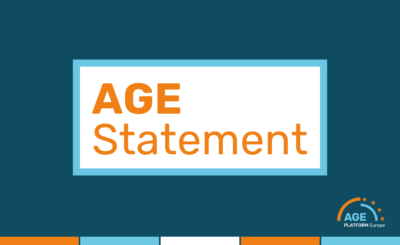Joint two-day event to mark the 10th World Elder Abuse Awareness Day
Brussels, 15-16th June 2015
On the International Elder Abuse Awareness Day, the Council of Europe, the European Commission, AGE Platform Europe and the European Network of Human Rights Institutions (ENNHRI) are co-organising a two-day conference to reaffirm everyone’s right to age in dignity and to be protected against all forms of elder abuse.
During the last few years, the taboo topic of elder abuse has started to gain visibility across Europe, and its dramatic consequences for individuals, families and the broader society are being increasingly acknowledged. The World Health Organisation (WHO) reports that the abuse of older people leads to an estimated 2,500 homicides every year in Europe. Furthermore, as many as one in four older people needing high levels of support may be victims of mistreatment.
Recognising the urgent need for the EU and national governments to take concrete action and develop specific measures to fight elder abuse in the context of an ageing society, AGE Platform Europe wishes to send a strong message to policy makers to put an end to Europe’s hidden shame.
“Every day we hear alarming news from all around Europe about older persons who are experiencing neglect, mistreatment and abuse. This is the most vicious form of age discrimination and is totally unacceptable”, stresses Anne-Sophie Parent, Secretary-General of AGE Platform Europe. “A rights-based approach in ageing policies would help fight against widespread elder abuse in Europe and ensure that older persons can continue to enjoy their human rights until the end of their life”, adds Ms. Parent.
Humbert De Biolley, Deputy Director of the Council of Europe office in Brussels, underlines the tools available to address this problem: “The European Court of Human Rights has protected whistle-blowers who have gone public over maltreatment in nursing homes. The European Social Charter grants older persons the right to social protection, including protection from abuse. The Committee for the Prevention of Torture has investigated nursing homes where older persons are held against their will. Moreover, older persons who witness abuse in their own homes are also protected by the convention on violence against women and domestic violence. Last year, our Committee of Ministers adopted a recommendation to governments on the human rights of older persons, which calls for increased awareness-raising in all 47 of our member states to eradicate mistreatment and abuse of elder people.”
At EU level two major tools could be used to advance older persons’ right to live in dignity, as states Salla Saastamoinen, Director in charge of Equality in the European Commission: “DG Justice and Consumers has an important responsibility to combat elder abuse. It is part of our broader role in combatting discrimination based on sex, racial or ethnic origin, religion or belief, disability, age or sexual orientation. Article 25 of the EU Charter of Fundamental Rights recognizes and respects the rights of the elderly to lead a life of dignity and independence and to participate in social and cultural life. This Article applies whenever EU rules are implemented. However, in our current EU anti-discrimination legislation there is an important gap when it comes to protection against discrimination on the ground of age in the areas of access to and supply of goods and services, including housing, social protection (including social security and healthcare) and education. That is why it is so important that the relevant 2008 Commission proposal for an Equal Treatment Directive shall be adopted by the Council. We are working hard to achieve this.”
Debbie Kohner, Secretary General of ENNHRI emphasizes the importance of appropriate human rights protection mechanisms to prevent elder abuse: “Elder abuse can lead to poor health outcomes for victims. National Human Rights Institutions throughout Europe, play a key role in protecting and promoting the human rights of all individuals, including older persons. This conference and the ENNHRI project on the human rights of older persons and long-term care in Europe, which we will introduce on that day, will play an important role in highlighting the international human rights framework for protecting older persons and in sharing innovative schemes for reducing the incidence of elder abuse.”
– END –
Useful links
- Joint event ‘Tackling elder abuse in Europe: a renewed commitment or a missed opportunity?’, 15-16 June 2015, Brussels
- Co-organisers’ websites and relevant activities:
- Council of Europe
- European Commission DG JUST and DG EMPL (and link to EC-SPC report on ‘adequate social protection for long-term care needs)
- AGE Platform Europe
- European Network of Human Rights Institutes
- Relevant hashtags on Twitter: #WEAAD2015 – #elderabuse – #endelderabuse






